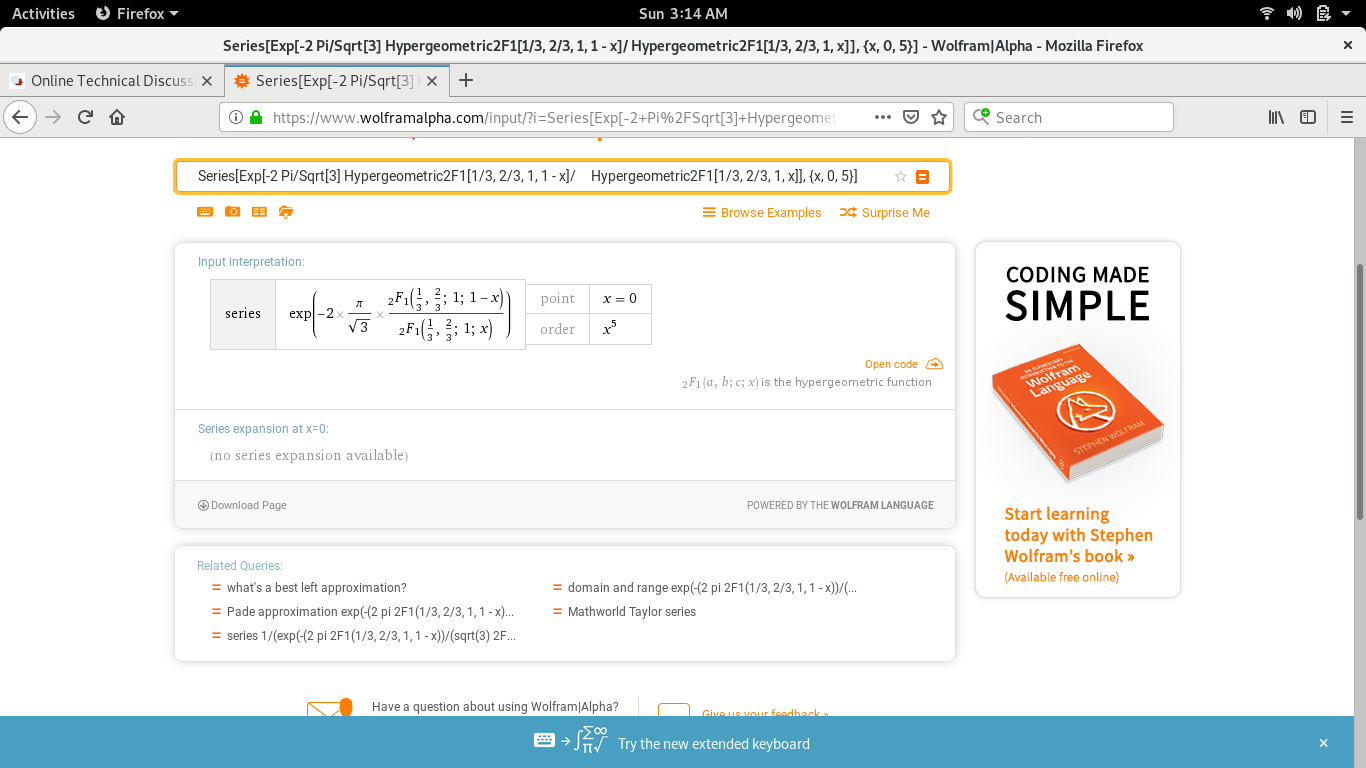Fail Cases
Series[Exp[-2 Pi/Sqrt[3] Hypergeometric2F1[1/2, 1/2, 1, 1 - x]/Hypergeometric2F1[1/2, 1/2, 1, x]], {x, 0, 5}]
Series[Exp[-2 Pi/Sqrt[3] Hypergeometric2F1[1/3, 2/3, 1, 1 - x]/Hypergeometric2F1[1/3, 2/3, 1, x]], {x, 0, 5}]
Series[Exp[-2 Pi/Sqrt[2] Hypergeometric2F1[1/4, 3/4, 1, 1 - x]/Hypergeometric2F1[1/4, 3/4, 1, x]], {x, 0, 5}]
Series[Exp[-2 Pi Hypergeometric2F1[1/6, 5/6, 1, 1 - x]/Hypergeometric2F1[1/6, 5/6, 1, x]], {x, 0, 5}]

Looks like something is going wrong on your end. Or try typing one of these into Wolfram|Alpha:

No response is slightly better than printing out nonsense, but why shouldn't we try and do better? I asked Bill Gosper, and he also thinks these expansions need to be fixed. We could try to do something like this:
Frobenius Method
TSol[PFCS_, nMax_] := With[{TAnsatz = {
Dot[a1 /@ Range[0, nMax], x^Range[0, nMax]],
Plus[Log[x] Dot[a1 /@ Range[0, nMax], x^Range[0, nMax]],
Dot[a2 /@ Range[0, nMax], x^Range[0, nMax]]]} /. {a1[0] -> 1,
a2[0] -> 0}}, TAnsatz /. Solve[# == 0 & /@
Flatten[CoefficientList[#, {x, Log[x]}][[1 ;; nMax]
] & /@ Dot[PFCS, D[TAnsatz, {x, #}] & /@ Range[0, 2]]],
Flatten[{a1 /@ Range[1, nMax], a2 /@ Range[1, nMax]}]
][[1]] /. {a1[_] -> 0, a2[_] -> 0}]
MapThread[With[{f1 = TSol[{#1 - 1, #1^2 (-1 + 2 x), #1^2 (-1 + x) x}, 14]},
Expand[1/#2 Normal[Series[Exp[f1[[2]]/f1[[1]]], {x, 0, 10}]] /. x -> #2 x]]
&, {{2, 3, 4, 6}, {16, 27, 64, 432}}]
Out[]:= {
x + 8 x^2 + 84 x^3 + 992 x^4 + 12514 x^5 + 164688 x^6 + 2232200 x^7 + 30920128 x^8 + 435506703 x^9 + 6215660600 x^10,
x + 15 x^2 + 279 x^3 + 5729 x^4 + 124554 x^5 + 2810718 x^6 + 65114402 x^7 + 1538182398 x^8 + 36887880105 x^9 + 895303119303 x^10,
x + 40 x^2 + 1876 x^3 + 95072 x^4 + 5045474 x^5 + 276107408 x^6 + 15444602248 x^7 + 878268335296 x^8 + 50588345910799 x^9 + 2944021398570264 x^10,
x + 312 x^2 + 107604 x^3 + 39073568 x^4 + 14645965026 x^5 + 5609733423408 x^6 + 2182717163349896 x^7 + 859521859502348352 x^8 + 341679883727799750159 x^9 + 136868519056531319862408 x^10
}
I'm also willing to give a talk as to why I think these are important evaluations and how they fit into the wider context of what we can possibly hope to accomplish using Mathematica.
Cheers --Brad
PS. Don't feel too bad, other than A005797, these expansions are not in OEIS either.